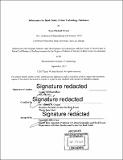| dc.contributor.advisor | Andrea M. Chegut. | en_US |
| dc.contributor.author | Stroud, Ryan Michael. | en_US |
| dc.contributor.other | Massachusetts Institute of Technology. Center for Real Estate. Program in Real Estate Development. | en_US |
| dc.date.accessioned | 2018-02-08T16:25:15Z | |
| dc.date.available | 2018-02-08T16:25:15Z | |
| dc.date.copyright | 2017 | en_US |
| dc.date.issued | 2017 | en_US |
| dc.identifier.uri | http://hdl.handle.net/1721.1/113468 | en_US |
| dc.description | Thesis: S.M. in Real Estate Development, Massachusetts Institute of Technology, Program in Real Estate Development in conjunction with the Center for Real Estate, 2017 | en_US |
| dc.description | Cataloged from PDF version of thesis. | en_US |
| dc.description | Includes bibliographical references (pages 63-64). | en_US |
| dc.description.abstract | Big Data Analytics is a term that represents an entire spectrum of analytical applications utilizing significant quantities of data, ranging from optimization at one end of the spectrum, to gaining new insights at the other end of the spectrum. This thesis focuses on the latter, leveraging private, public, and manually developed databases at the MIT School of Architecture and Planning's Center for Real Estate's Real Estate Innovation Lab (REIL) to observe, dissect, and ultimately improve our collective understanding of the current state of urban technology databases. The thesis seeks to explore how companies are providing data within the realm of the built environment, through a study of the information products that they offer. To preserve the confidentiality of the original commercial databases and limit the scope of the investigation, the dataset for this study contains only the data fields from 31 unique databases provided by 14 commercial real estate data aggregators. In essence, the dataset for this thesis is a database of databases, stripped of their numerical information and focused on a study of the variation in data. For analysis this employs computational, statistical, and graphical methods to interpret the information provided by the commercial real estate data aggregators. With an increasingly digital future ahead, this thesis proposes a general framework for examining numerous databases and their respective approaches to the built environment. This thesis also explores the merits of specific processes and presentation methods that translate an immense and disparate array of information into user-friendly analytical tools. | en_US |
| dc.description.statementofresponsibility | by Ryan Michael Stroud. | en_US |
| dc.format.extent | 64 pages | en_US |
| dc.language.iso | eng | en_US |
| dc.publisher | Massachusetts Institute of Technology | en_US |
| dc.rights | MIT theses are protected by copyright. They may be viewed, downloaded, or printed from this source but further reproduction or distribution in any format is prohibited without written permission. | en_US |
| dc.rights.uri | http://dspace.mit.edu/handle/1721.1/7582 | en_US |
| dc.subject | Center for Real Estate. Program in Real Estate Development. | en_US |
| dc.title | Informatics for real estate : urban technology databases | en_US |
| dc.type | Thesis | en_US |
| dc.description.degree | S.M. in Real Estate Development | en_US |
| dc.contributor.department | Massachusetts Institute of Technology. Center for Real Estate. Program in Real Estate Development | en_US |
| dc.contributor.department | Massachusetts Institute of Technology. Center for Real Estate | |
| dc.identifier.oclc | 1019901777 | en_US |
| dc.description.collection | S.M.inRealEstateDevelopment Massachusetts Institute of Technology, Program in Real Estate Development in conjunction with the Center for Real Estate | en_US |
| dspace.imported | 2019-09-16T18:44:15Z | en_US |
